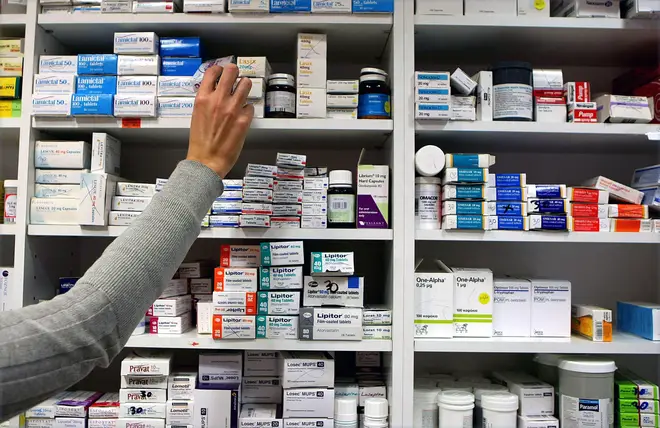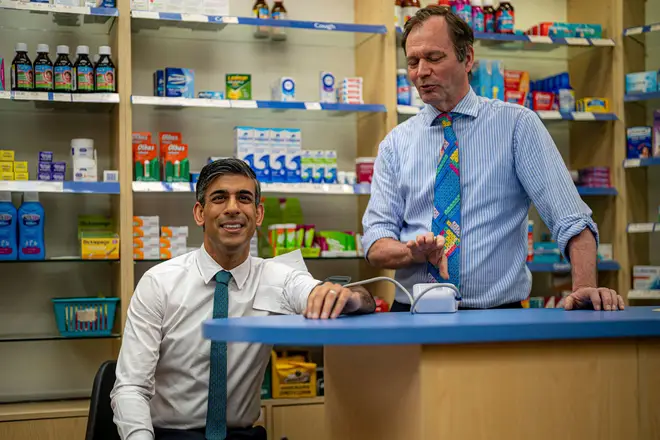
Clive Bull 1am - 4am
19 December 2023, 07:29

Pharmacies in England are “really struggling” with “chronic underfunding” leading to eight closures a week, an average of over one a day, LBC can reveal.
Working alongside The Company Chemists' Association (CCA) LBC has learned that since 2015 there has been a net loss of 1,055 pharmacies, which has exacerbated in recent months. This financial year has seen a loss of over 300 pharmacies, which is more than the past two financial years combined.
Malcolm Harrison, the CEO of the CCA, has told LBC that “there is chronic underfunding of community pharmacies” citing the fact that “the money made available to pharmacies for supplying NHS medicines and services to the public has not changed since 2016, when it was cut by over £200 million”.
Coupled with the sector having to deal with both the Covid pandemic and the cost-of-living-crisis, Mr Harrison says “pharmacy businesses are really struggling and unfortunately we are hearing more and more are ‘going to the wall’, either closing or choosing to exit the market”.

The medical chief also warned that the effect will be significant on patients, saying “all this means it is becoming harder and harder for patients to find a pharmacy that can supply them the medicines they need and the clinical care and advice they might need”.
There is also significant concern about the effect on regional inequality. The figures demonstrate that since 2015 the rate of closures in the most deprived areas of England are more than triple those in the least deprived areas – with the worse affected regions identified as the North West, South East, West Midlands and London.
In London for example there has been a net loss of 109 pharmacies since 2015.
Labour MP Peter Dowd told LBC “If you live in a more-deprived area the number of pharmacies available for you to get to are diminishing, and they tend to be in those areas where there is the greatest need”.
Mr Dowd, who is also the Vice Chair of the All-Party Pharmacy Group, said it was part of “a broader issue with health services more generally… There is a malaise generally across the provision of services in the NHS”.
The former Labour Shadow Minister also cast doubt on the government’s planned expansion of community pharmacy roles.
Soon pharmacists will be able to prescribe medicine for common conditions, such as earache, sore throats and urinary tract infections without seeing a GP as part of a government plan to ease pressure on doctors surgeries. Whilst the government also announced a consultation looking into changes to medical supervision requirements in pharmacies.
But Peter Dowd expressed concern “There’s a bigger issue here, the workforce problem that has to be solved. By an expansion of the pharmacy sector will it be able to cope with more demands? And I’m not quite sure it will be able to”.
Whilst Malcolm Harrison explained that pharmacies are regularly losing money by stocking certain medicines. He said “The work that pharmacies do in supplying medicines quite often is loss-leading – the money that the NHS pays pharmacies to supply medicines leaves them out of pocket”
“When a business goes under, and those patients look to go to other pharmacies, the business they are bringing is non profitable and costs the pharmacy money. What that then does is weaken the pharmacies around them”.
“We are very concerned about a ‘cascade effect’ where you will see localised closures being seen as a contagion which then has a significant impact on other local pharmacies”.

Tom Swarbrick unpacks statement from pharmacy director who thinks NHS is making people 'lazy' about 'health'
A Department of Health and Social Care spokesperson told LBC: “Community pharmacies play a vital role in our healthcare system and we are carefully monitoring access to pharmaceutical services. About 80% of people still live within a 20-minute walk of a community pharmacy.
“We have already announced £645 million in additional funding and thousands more training places for pharmacists as part of the Long Term Workforce Plan, on top of the £2.6 billion we provide every year to the sector.”